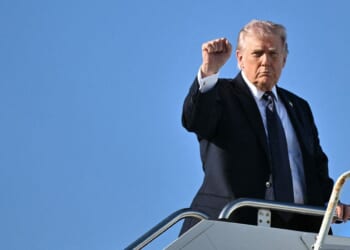The respective powers of the President and Congress with regard to spending have been a subject of debate since at least the 1970s. The issue has heated up under the Trump administration, as, through DOGE and other initiatives, the administration has tried to put the brakes on wildly out of control spending under the Biden regime.
One of the lawsuits that has arisen in that context is DEPARTMENT OF STATE, ET AL. v. AIDS VACCINE ADVOCACY COALITION, ET AL., which arises out of the administration’s freezing of several billion dollars in foreign aid spending. Today the Supreme Court sided with President Trump at a preliminary, but highly significant, stage of that lawsuit. The District Court had entered a preliminary injunction that required the administration to fund the programs in question while the lawsuit proceeded, for years, through the courts. In cases like this one, preliminary relief is really permanent relief.
Today the Court stayed that preliminary injunction, which means the government can hang on to the money that is in question while the case proceeds:
The application for stay presented to THE CHIEF JUSTICE and by him referred to the Court is granted. The Government, at this early stage, has made a sufficient showing that the Impoundment Control Act precludes respondents’ suit, brought pursuant to the Administrative Procedure Act, to enforce the appropriations at issue here. The Government has also made a sufficient showing that mandamus relief is unavailable to respondents. And, on the record before the Court, the asserted harms to the Executive’s conduct of foreign affairs appear to outweigh the potential harm faced by respondents. This order should not be read as a final determination on the merits. The relief granted by the Court today reflects our preliminary view, consistent with the standards for interim relief.
Emphasis added. The Supreme Court properly acknowledged that foreign aid is an aspect of foreign policy, and under the Constitution the President is, for the most part, in charge of foreign policy. Also, while today’s order is preliminary and not final, it does reflect the Court’s “preliminary view,” which is unlikely to change.
Elena Kagan, the smartest of the three left-wing justices, dissented from the Court’s order, as she has done in other cases:
[T]he stakes are high: At issue is the allocation of power between the Executive and Congress over the expenditure of public monies.
Indeed. This gets to the heart of the matter:
The Executive says that to comply with the District Court’s order to obligate the $4 billion, it will have to “enter into negotiations” with “foreign states or international organizations.” Application 35. And in those discussions, the Executive protests, it will have to “advocate against its own objectives”—“undermin[ing]” its real view that the expenditures are “contrary to U. S. foreign policy.” Id., at 3, 34–35. But that is just the price of living under a Constitution that gives Congress the power to make spending decisions through the enactment of appropriations laws. If those laws require obligation of the money, and if Congress has not by rescission or other action relieved the Executive of that duty, then the Executive must comply. It cannot be heard to complain, as it does here, that the laws clash with the President’s differing view of “American values” and “American interests.” Id., at 34. That inconsistency, in other words, is not a cognizable harm, to be weighed in the equitable balance. It is merely a frustration any President must bear.
What Kagan never mentions is that the specific programs that our foreign aid has funded–a “trans opera” in a foreign country, a “trans comic book,” and so on–were never voted on by Congress. Congress gave a blank check to an executive agency that is constitutionally under the control of the President, and the President decided that we will be better off if some of the dollars in that blank check are not spent.
Happily, it seems that the Democrats’ view, that the President must conduct the foreign policy of the Democrats to the extent that it is funded by Congress, is now in the minority.
















